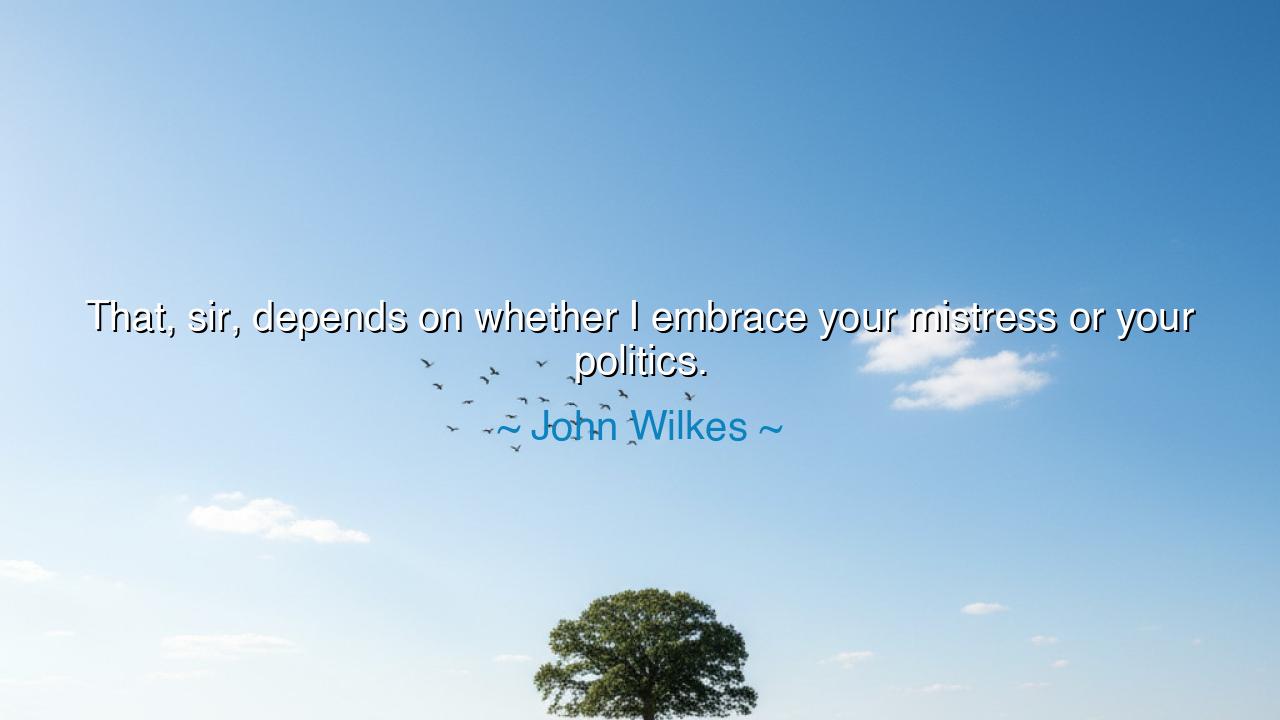
That, sir, depends on whether I embrace your mistress or your






The words of John Wilkes, “That, sir, depends on whether I embrace your mistress or your politics,” flash like a dagger wrapped in wit. They reveal the sharp tongue of a man who understood that power, whether in intimacy or in governance, is often won not through virtue but through the favor of others. With this retort, Wilkes shows that alliances can be born from passion or from ideology, but both are entanglements of desire and advantage. His humor disguises a deeper truth: the affairs of the heart and the affairs of the state often run together, and both are ruled by the same games of loyalty and betrayal.
John Wilkes was no ordinary wit, but a radical figure in eighteenth-century England. A journalist, politician, and champion of liberty, he battled against royal authority and corrupt ministers. His tongue was as dangerous as his pen, and he often wielded ridicule to cut down his enemies. This quote was born from such a moment, when challenged by a rival. In answering with laughter, Wilkes exposed the hypocrisy of politics—how men would judge him less for his principles than for the company he kept.
History is filled with such unions of politics and passion. In Renaissance courts, mistresses often held influence equal to ministers. Diane de Poitiers, beloved of King Henry II of France, shaped policy and wielded authority through her closeness to the king. Was it love, or was it politics? To Wilkes, the two could never be fully separated. To embrace a mistress was to gain favor; to embrace a policy was to win allies. Both were ways of binding oneself to another’s cause.
Yet Wilkes’s jest also warns of danger. The man who ties himself too closely to either mistress or politics risks losing freedom. Desire may corrupt judgment, just as ambition may corrupt virtue. By making light of both, Wilkes placed himself above them, claiming the liberty of one who will not be enslaved by passion nor party. His answer was defiance cloaked in charm, a reminder that true power lies in refusing to bow to the expectations of others.
So let this teaching be remembered: both love and politics are arenas of power, and both can ensnare the unwary. The wise must know when to embrace and when to resist, when to yield and when to stand free. Wit, as Wilkes shows, can be a shield as sharp as any sword, exposing truth in laughter and turning insult into triumph. For in the games of both passion and politics, the victor is not always the strongest, but often the one whose tongue cuts deepest.






QNQuynh Nhu
Wilkes' quote suggests a kind of playful but serious dilemma between personal pleasures and political allegiance. It seems to indicate that people’s choices can be swayed by immediate desires rather than ideals. How often do we allow our relationships or emotions to dictate our actions, particularly when it comes to more serious matters like politics? Does this reveal a flaw in our decision-making process, or is it just a reflection of the complexities of human nature?
TTDieu Linh Tran Thi
This quote plays on the idea that personal relationships can heavily influence decisions that might otherwise be rooted in politics or duty. It raises an interesting point about whether our values are shaped more by who we are closest to or by the larger political ideologies we align with. How often do our personal lives sway our professional decisions, and is that a natural part of human behavior?
NNnhung nguyen
Wilkes’ quote seems to encapsulate the tension between private indulgences and public responsibilities. The choice between embracing a mistress or politics could symbolize the larger conflict many people face when navigating personal relationships versus societal roles. Does this quote suggest that individuals are inherently selfish or merely human in prioritizing personal needs? How much influence do personal attachments have on our professional or political decisions?
KNKhuyen Nguyen
Wilkes’ statement seems to capture the complex and sometimes contradictory nature of human behavior. It highlights how personal interests, especially those tied to relationships, can clash with political or moral beliefs. Is it possible to fully embrace one’s politics without it conflicting with personal desires? Or do we inevitably allow our personal lives to shape our political views and actions?
LMLeonard Mei
This quote feels like it’s about the choices we make between the personal and the political. Wilkes seems to suggest that one’s allegiance can shift depending on the situation—whether it’s embracing personal desires or political ideals. It makes me question whether we, as individuals, tend to let personal relationships and ambitions affect our larger commitments. How often do personal biases impact the way we approach bigger issues like politics?